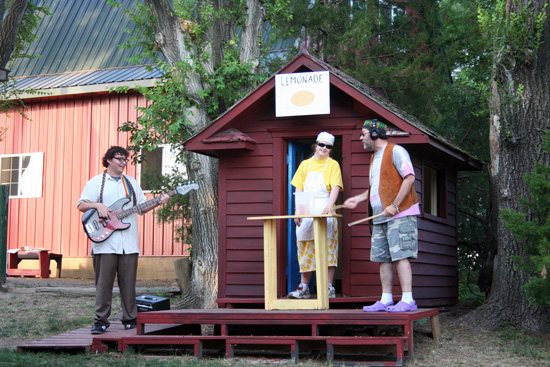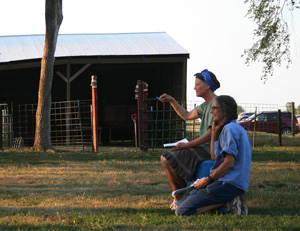Janet Schlapkohl gets impatient when people try to praise her for being “so patient.”
“I’m the least patient person I know,” says Schlapkohl, who 10 years ago founded Combined Efforts, a local non-profit theatre group.
Schlapkohl—playwright, director, actor, and recent University of Iowa Master of Fine Arts graduate in playwriting—designed Combined Efforts to be inclusive. The group welcomes performers, set designers, writers, and other lovers of theatre from a wide variety of backgrounds. Her community-wide vision of theatre also specifically integrates people with special needs into its productions.
The “so patient” praise she rejects refers to a misconception some well-meaning people may have when they reflect on her work with Combined Efforts. She has a low threshold for condescension directed toward her special-needs actors.
“The depth of human emotions isn’t any less profound in the special needs population,” Schlapkohl says. “We’re making theatre accessible to a wider variety of people. This is an old tradition. Look at Shakespeare’s ‘Richard III.’ Just as playwrights write to include different elements for different characters, with different parts written to highlight skills that people bring to theatre, we’re working together to tell a story.”
A Final Dress Rehearsal
Shlapkohl has a few writer/director notes for the cast (more than 30 actors) after the final dress rehearsal for Combined Efforts’ 2012 summer play “What’s Happenin’ at the County Fair.” First, the sequence of bows at the end of the play has to be well-coordinated to avoid congestion on stage.
“Don’t hold hands,” she says. “You’ll just get in each other’s way.”

A few key props are still needed, and she reminds one of the zombies wearing khaki cargo shorts that he is only supposed to be dressed in black, white, or gray for his role.
“Also,” reminds Schlapkohl, “no talking backstage in loud baritone voices.”
Andrea Chapman, photographer for Combined Efforts, marvels at Schlapkohl’s talent and the performances her casts deliver. Some of the cast began acting in her productions as high school students and returned year after year, becoming increasingly confident and accomplished performers.
“She’s not easy on the kids,” says Chapman. “I mean she’s really hard—‘You’ve got to do this,’ she’ll say, ‘You’ve got to do that’—but they adore the woman, they really do. Many times people come to these plays not knowing quite what to expect and are absolutely dazzled, because they don’t expect to see this combination. The respect and dignity evident within the company as it puts on a witty, thoughtful, entertaining production is hard not to admire.”
Nicholas Johnson, adjunct professor at the UI College of Law, played the Mayor in the 2012 summer play. Johnson says Schlapkohl’s creativity and energy are amazing. “If a kid comes along who wants to participate, she writes a part into the script he can handle. That’s really fabulous—it’s what sets this operation apart.”
“We’ve got a lot of theatre in Iowa City, but what they’re doing with these kids is just remarkable, and it does as much good for these kids without special needs as those with. They work together, they support each other, and that’s something that will influence the rest of their lives in terms of their ability to relate with everybody that they encounter in society. So many kids are sheltered from kids who aren’t exactly like them,” says Johnson.
Johnson’s wife Mary Vasey, who played Sister Susan in “County Fair,” is a member of the Combined Efforts Board of Directors. She first got involved through her grandson, who has a vocal disability.
“He wanted to act, and I heard about Janet.” says Vasey. “Then I thought, ‘I really want to help with this.’”

Her grandson played washtub bass for The Rusty Cans, a jug band featured in the summer play. And he played the lead as Scrooge in “A Carol for Our Times.”
Between scenes at dress rehearsal, Vasey reflects on the importance of Combine Efforts. In the background, a neatly dressed British-invasion-style rock group works out a few kinks in their performance—an amplifier howls, a chord crackles.
“We have people with and without special needs performing,” says Vasey. “We’re really trying to go to the strength of every person that’s in it, and I think that has a huge impact. I know it does on the performers—there’s a lot of confidence building, a lot of understanding. It’s really a good experience for them, and I think it also helps the community, just to know that this can go on.”
Schlapkohl says the writer/director may have a strong vision for the play, but still not have all the answers.
“To collaborate well in the theatre you have to have a sense of what it should look like, but you can’t have any sense of ego,” Schlapkohl says.
“We recently did a show for autism awareness week. Young men were doing choreography for cowboy songs. I’d choreographed it one way. One young man had a better idea how to do it. It doesn’t have to be how I think it should be all the time.”
Hubbard Human Rights Award winner
Schlapkohl won the 2012 Philip G. Hubbard Human Rights Award for writing plays that explore human rights issues and for fostering collaboration between students with disabilities and their peers. The City of Iowa City honored Schlapkohl with the Isabel Turner Human Rights Award in 2009.
She says the honors are “very sweet, but I always feel undeserving.”
Schlapkohl’s work as a student at the Iowa Playwrights Workshop addressed issues of justice and ethics. “Triangle” (2011) dramatized the inhumane working conditions revealed by the fire that killed 146 immigrant women at the Triangle Shirtwaist Company in 1911. This play won the Richard Maibaum Scholarship in Playwriting, awarded to a student whose play is judged to be the work of a writer of promise and originality, with special attention given to works reflecting social issues. Her 2012 production “Collective Amnesia: A Study of Episodic Memory,” meditates on the nature of science and soul, an exploration that drew on her experience working in a neuroanatomy lab years ago.
A native of West Union, Iowa, Schlapkohl majored in biology as an undergraduate, and her husband, David, is a large animal veterinarian with a practice in Kalona. They have three children and two grandchildren. Schlapkohl decided to pursue her MFA at Iowa because, she says, “I knew I would regret it if I never applied to the program.”
What’s next?
Now that she’s finished her MFA, Schlapkohl will continue to submit her work to festivals nationwide, but she isn’t hot-footing it to Broadway to see her name in the brightest lights on the biggest stages. She derives more meaning from theatre that embraces and reaches out to the community.
“This is a great place to work, and the Midwest is an excellent, well-educated audience,” she says, adding she likes being able to drive easily to a show and have family and friends in the audience.
“There’s something wonderful about going to a show with people you know,” she adds.
True to that ethos, she stages Combined Efforts’ “County Fair” summer play series very close to home, around the perimeter of her farm house on the outskirts of Iowa City.
In the coming years, Schlapkohl plans to focus on sustaining and building on the success of Combined Efforts. She plans to write grants, as she says the non-profit never had any money beyond ticket sales. She thanks Iowa City High School, where her program had its beginnings and where many of the plays have been staged. And she thanks Doug Lestina, City High dean of junior and senior students, for his support and belief in Combined Efforts.
She would like the program to grow, using the inclusive theatre model for acting and playwright workshops, and students from many local high schools were included in the summer 2012 production. She thinks Combined Efforts could expand further and she hopes community organizations, such as Big Brothers/Big Sisters and Systems Unlimited, could “use what we do.”
Her long-term goal is to develop a year-long inclusive theatre course at the University of Iowa called “Theatre for Special Populations.” She envisions students from beyond the university could be involved in a world that doesn’t always make a place for them.
“Wouldn’t that be great if all kinds of kids could do this every year?” says Schlapkohl.
“I think Philip G. Hubbard would have liked this.”